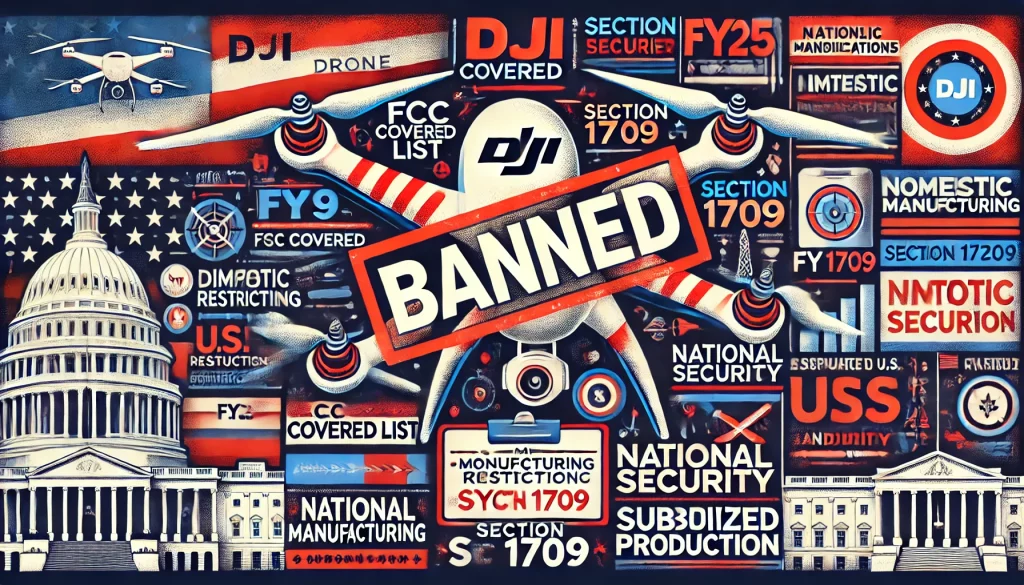
TLDR: Section 1709 is a wider scope DJI ban than the CCP drone act, and would cease operations of all DJI drones within a year of passing. If and when it passes.
The U.S. drone industry is poised for a monumental shift, as Section 1709 of the Fiscal Year 2025 National Defense Authorization Act (FY25 NDAA) marks a significant step toward ending America’s reliance on drones produced by companies linked to the Chinese Communist Party (CCP). Known as an amended version of the Countering CCP Drones Act, this legislation not only aims to dismantle China’s dominance in the U.S. drone market but also initiates a critical transition period for the industry.
While a ban on DJI and similar manufacturers is not a direction the drone industry has sought, recent geopolitical actions by China have underscored the necessity for the United States to strengthen its domestic drone manufacturing capabilities.
Key Provisions of Section 1709
- FCC Covered List Designation
- DJI, Autel Robotics, and their subsidiaries and affiliates are slated for addition to the FCC’s Covered List within one year of the NDAA’s enactment unless a national security agency determines they no longer pose a significant risk.
- This designation aims to curb security concerns while setting the stage for reducing reliance on CCP-linked drones.
- Accelerated Actions for Immediate Risks
- If these companies are deemed an immediate threat, the FCC will move swiftly, placing them on the Covered List before the one-year deadline.
- Import and Infrastructure Restrictions
- Once on the list, these companies will be barred from importing new drones or using U.S. communications infrastructure, limiting their presence in the U.S. market.
Implications for the Drone Industry
The enactment of Section 1709 represents a seismic change for drone operators, businesses, and enthusiasts in the United States. By targeting DJI, Autel Robotics, and their affiliates, the legislation forces the industry to explore alternative solutions and adopt domestically approved drone systems. Here’s what it means for stakeholders:
- Transition to American Drones The legislation provides an opportunity for American drone manufacturers to fill the void, fostering innovation and independence in the industry. Options include Freefly Astro, Skydio, Inspired Flight.
- Increased Costs and Compliance Drone operators may face higher costs as they transition to compliant systems, but the shift also ensures better alignment with national security objectives.
- Challenges for Current Users Existing operators of DJI and Autel drones will need to plan for their transition, especially as access to repairs, replacements, and software updates may become limited.
The Need for Domestic Manufacturing
The drone industry’s reliance on Chinese manufacturers like DJI has long been a point of contention. However, recent retaliatory actions by China have brought the issue into sharper focus. These actions underscore the importance of fostering domestic drone manufacturing to ensure that the U.S. is not vulnerable to disruptions caused by geopolitical tensions.
For the U.S. to compete globally and maintain leadership in drone technology, the following steps are essential:
- Subsidizing Domestic Production
- To compete with China’s low-cost drone options, the U.S. must provide subsidies to incentivize domestic manufacturing and level the playing field for American companies.
- Fast-Tracking Manufacturing Maturity
- The U.S. government should prioritize policies that accelerate the development of manufacturing capabilities. This includes investing in research, streamlining regulations, and fostering public-private partnerships.
- Developing Affordable Drone Options
- A robust domestic drone industry must offer affordable alternatives to ensure adoption by both hobbyists and commercial operators. Competitive pricing will help sustain the market while reducing dependence on foreign systems.
Implications for the Industry
While the prospect of banning DJI drones is unsettling for many in the drone community, it highlights a broader issue: the lack of competitive, cost-effective alternatives in the U.S. market. Transitioning to domestic systems will require investment, innovation, and collaboration between the public and private sectors.
For drone operators and businesses, the transition means:
- Evaluating U.S.-approved drone platforms that align with their operational needs.
- Educating clients about the implications of the ban and the benefits of transitioning to domestically produced drones.
- Advocating for policies that support affordability and accessibility in the U.S. drone market.
Conclusion
The potential ban on DJI drones is a wake-up call for the U.S. to prioritize self-reliance in the drone industry. While this move may not align with the preferences of many in the field, it highlights the critical need for the United States to develop a resilient domestic manufacturing base.
To ensure a smooth transition and maintain global competitiveness, the U.S. must subsidize domestic drone production, fast-track manufacturing capabilities, and create affordable, high-quality options for the industry. These measures will not only strengthen national security but also position the United States as a global leader in drone technology.



Add Your Comment